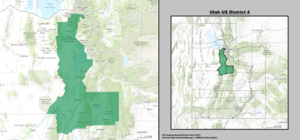| Utah's 4th congressional district | |
|---|---|
Interactive map of district boundaries since January 3, 2023 | |
| Representative | |
| Distribution |
|
| Population (2024) | 920,865 [1] |
| Median household income | $109,469 [1] |
| Ethnicity |
|
| Cook PVI | R+14 [2] |
Utah's 4th congressional district is a congressional district created by the state legislature as a result of reapportionment by Congress after the 2010 census showed population increases in the state relative to other states. [3] Prior to 2010 reapportionment, Utah had three congressional districts. [3]
Contents
- Recent election results from statewide races
- 2023–2027 boundaries
- 2027–2033 boundaries
- List of members representing the district
- Election results
- 2012
- 2014
- 2016
- 2018
- 2020
- 2022
- 2024
- References
- Notes
- External links
Some 85 percent of the new district is concentrated in Salt Lake County and it includes a portion of Salt Lake City, which is shared with the 1st and 2nd districts; it also includes parts of Utah and Juab counties and all of Sanpete County. [4] [5] [6] [7] With a Cook Partisan Voting Index rating of R+14, it is the most Republican district in Utah, a state with an all-Republican congressional delegation. [2]
As a result of redistricting, the 2012 party candidates included Democratic U.S. Congressman Jim Matheson, who had previously represented Utah's 2nd congressional district from 2001 to 2013. The Republican nominee was Mia Love, mayor of Saratoga Springs and running for Congress for the first time. She won the Republican nomination in 2012 over two state representatives, Stephen Sandstrom and Carl Wimmer, at the Republican state convention.
Democratic candidate Matheson narrowly won the election against Love on November 6, 2012, and represented Utah's 4th congressional district until January 2015. [8] He decided not to seek re-election. [9] In 2014, Mia Love ran again for the seat and won in the general election, defeating Democratic candidate Doug Owens. She became the first Haitian American and the first black female Republican elected to Congress, as well as the first black person of either sex elected to Congress from Utah.
In the 2018 elections, Love ran for a third term, losing to Salt Lake County mayor Ben McAdams by 694 votes out of almost 270,000. As a result of McAdams's election, the district became the most Republican district in the country to be represented by a Democrat. [10] In 2020, Republican Burgess Owens narrowly defeated McAdams to regain the congressional seat for the Republican Party and was re-elected with over 61% of the vote in 2022 and 2024.







